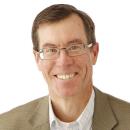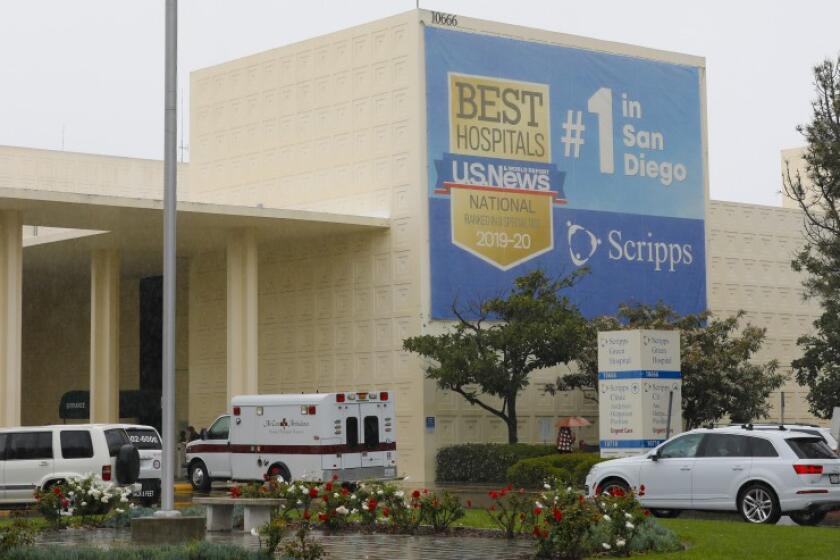Judge orders release of convicted killer Jane Dorotik over coronavirus fears in prison

- Share via
A San Diego County Superior Court judge ordered the release from prison of Jane Dorotik, a 73-year-old former Valley Center woman who was found guilty in 2001 of murdering her husband, and who has mounted a legal attack that could overturn her conviction.
The move on Monday by Superior Court Judge Harry Elias came when lawyers from the Loyola Law School Project for the Innocent filed an emergency plea seeking her release from the California Institution for Women in Chino. The lawyers argued that Dorotik was at great risk of contracting the COVID-19 disease because of her age, underlying health condition and the fact that the disease has a higher fatality rate inside prisons than elsewhere. They also contended she has a strong case for exoneration.
Elias granted the motion following a telephone hearing held under the emergency conditions because of the pandemic that has closed courthouses in San Diego County to the public and limited court operations to some criminal matters.
Dorotik is expected to be released from the prison Wednesday morning and will stay with her sister in Los Angeles County. She will have to self-quarantine for two weeks, is prohibited from leaving the state and must wear a GPS ankle monitor, said Paula Mitchell, the legal director of the group that is fighting a lengthy battle to prove her innocence.
The San Diego County district attorney’s office opposed Dorotik’s release. Prosecutors argued the conviction still stands and Dorotik’s situation did not qualify for the highly unusual step of releasing her, according to a statement from spokesman Steve Walker.
Dorotik is serving a 25-years-to-life sentence for the killing of her husband, Robert. At the time of the killing, Dorotik was a high-level executive for a mental health services company. She reported her husband missing on Feb. 13, 2000, and told authorities the last time she saw him was earlier that day as he prepared to go running.
His body was found the next day about two miles from the family ranch. He had been strangled and beaten. Jane Dorotik was arrested a few days later. The circumstantial evidence against her included blood found in the master bedroom, and a syringe that prosecutors argued had Jane Dorotik’s fingerprint on it along with smudge of her husband’s blood.
After her conviction and sentencing, lawyers from the Project for the Innocent took up her case. They filed a massive habeas corpus petition seeking a new trial based on bogus forensic evidence, a flawed police investigation that overlooked suspects and hid evidence, and new DNA testing that they say refutes evidence against Dorotik.
The new DNA evidence includes scrapings from underneath Robert Dorotik’s fingernails, DNA from a rope used to strangle him and the clothes he was found in — all of which excludes Jane Dorotik as a contributor, according to court papers.
Elias, who is hearing that petition, had earlier ordered a full-blown hearing on the new claims, a crucial step in post-conviction proceedings that the vast majority of defendants do not get. In his Oct. 19 ruling, he wrote Dorotik’s lawyers had presented “voluminous evidence to establish that much of the forensic, DNA and blood evidence presented against her at trial was false and that arguments to the jury included extensive false statements regarding the forensic evidence.”
But before that hearing could be held, the COVID-19 pandemic took hold and shuttered the courthouses in San Diego County. The order issued by Presiding Judge Lorna Alksne on April 3 and again on April 6 closing the courts listed the emergency matters that the court would be open to hear.
Missing from that list were actions such as Dorotik’s — habeas corpus filings that challenge the legality of a person’s detention.
Mitchell said that violates the suspension clause of the U.S. Constitution, which says the habeas corpus writ proceeding can only be stopped during times of rebellion or invasion.
The lawyers then went to the 4th District Court of Appeal seeking an order telling the Superior Court to change the court closure order to allow post-conviction filings to be heard. The filing notes that numerous other courts in the state, all of which have truncated hours and services, prohibited filing habeas petitions as San Diego County did.
Before the appeals court could rule, the Superior Court issued a revised order on April 17 allowing cases such as Dorotik’s to be considered by the court under the emergency.
Mitchell said that lawyers argued that not only was there strong evidence Dorotik would win and get a new trial whenever the evidentiary hearing is held, but also that it would be tragic if she were to contract and possibly die from COVID-19 before being able to prove her innocence.
Walker in the statement said that prosecutors are not conceding anything. He said a jury convicted Dorotik, that the conviction has been upheld on appeal and now Dorotik is in the midst of another effort to win her freedom.
“We presented our position that this case did not merit extraordinary relief in spite of the ongoing COVID-19 crisis due to the very serious nature of the crime and the fair review processes available,” he said.
More to Read
Sign up for Essential California
The most important California stories and recommendations in your inbox every morning.
You may occasionally receive promotional content from the Los Angeles Times.














